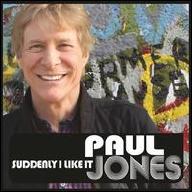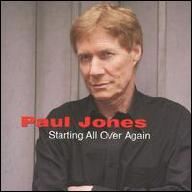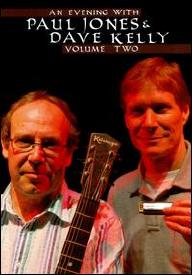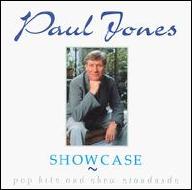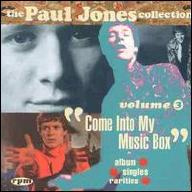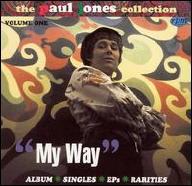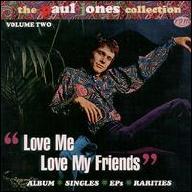Paul Jones was born Paul Pond on February 24, 1942 in Portsmouth, a port city in Southern England. Jones was attending Oxford University when he made his first steps toward a career in music, sitting in on vocals and harmonica at West London's Ealing Jazz Club, where Alexis Korner's Blues Incorporated and a pre-Rolling Stones Brian Jones frequently performed. In 1962, he joined the Mann-Hugg Blues Brothers, a combo founded by keyboard player Manfred Mann and percussionist Mike Hugg. As the group developed a following, they were signed to His Master's Voice (HMV), the British branch of RCA, and producer John Burgess persuaded them to streamline their name, simply billing themselves as Manfred Mann. In 1964, the band scored their first British hit with "5-4-3-2-1," which rose to number five on the U.K. charts. Later that year, they released "Doo Wah Diddy Diddy," which went all the way to number one England, and would repeat the feat in the United States, while "Sha La La" peaked at number three in the U.K. and number 12 in America. In their hits, Jones' tough, bluesy vocals added a welcome punch to the band's blend of R&B and beat music.
Despite his success with Manfred Mann, Jones grew restless and wanted to pursue a solo career as well as acting. In July 1966, he quit the group, with Mike d'Abo taking his place, and he soon released his solo debut, My Way; it included the single "High Time," which peaked at number four on the British charts. He had a number five hit in 1967 with "I've Been a Bad, Bad Boy," which was recorded for the film Privilege, a mockumentary about a pop star used by the government to manipulate impressionable youth that gave Jones his first leading role in a feature film. The picture was only modestly successful at the box office but earned positive reviews and went on to become a cult favorite; a soundtrack EP was released in the U.K., while a full-length appeared in the United States. In 1968, Jones issued a second album, Love Me, Love My Friends, and took part in a tour of Australia and New Zealand with the Who and the Small Faces that saw the musicians often running afoul of the more conservative side of the local press. The same year, he starred in another film, The Committee, an ominous satire that featured music by Pink Floyd and Arthur Brown.
Another solo album appeared in 1969, Come Into My Music Box, which was dominated by psychedelic pop sounds, but sales were unimpressive and Jones began devoting more time to acting, finding steady work on the legitimate stage and on television. In 1971, he contributed vocals to Escalator Over the Hill, a "jazz opera" by Carla Bley and Paul Haines, and issued a solo effort, a prog-influenced LP for Vertigo called Crucifix in a Horseshoe. Following more television and theater work (including a guest starring role on the popular sci-fi series Space: 1999), he appeared on Andrew Lloyd Webber and Tim Rice's original 1976 concept album Evita, which was the basis of the internationally successful musical. On the album, he sang the role of Juan Peron. In 1978, Jones cut a novelty single produced by Tim Rice in which he sang polished, midtempo, string-laden covers of the Sex Pistols' "Pretty Vacant" and the Ramones' "Sheena Is a Punk Rocker." The following year, Jones launched a new musical project, teaming with guitarist Tom McGuinness (formerly of Manfred Mann, the Roosters, and McGuinness Flint) to form the Blues Band, playing blues and R&B in the classic style, with Jones on blues harp and lead vocals. The group quickly became a popular live act, but initially no record labels were interested. Undaunted, they self-released their debut LP, The Official Blues Band Bootleg Album, with hand-stamped sleeves, and soon sold out their initial pressing of 3,000 copies. Arista struck a deal with the Blues Band to reissue the set, and it became the first of 21 albums the group would release between 1980 and 2022, when they offered what they declared would be their final album, So Long. In 1982, former Human League members Martyn Ware and Ian Craig Marsh invited Jones to lend vocals and harmonica to a cover of R. Dean Taylor's "There's a Ghost in My House" for Music of Quality and Distinction, an album from their ad hoc group B.E.F. (British Electric Foundation), devoted to electronic reworkings of hits of the '60s.
During his downtime from the Blues Band and his acting roles, in 1991 Jones put together a special concert to celebrate the 50th birthday of his bandmate Tom McGuinness. The band included Jones, McGuinness, and several other Manfred Mann alumni, including keyboard player Mike Hugg and multi-instrumentalist Mike Vickers, and focused on material from Manfred Mann's salad days. They were billed as the Manfreds (though Mann himself did not participate), and the concert was a roaring success. The Manfreds soon became a going concern, performing when the schedules of the participants allowed and cutting the first of six albums, 5-4-3-2-1, in 1998. Jones continued to pursue his acting career, appearing in successful stage revivals of Guys and Dolls, The Beggar's Opera, and Kiss Me Kate in the U.K., and in 1986 he became the host of a BBC Radio 2 series The Blues Show, where he spun classic blues and R&B sides; the series would run for 32 years and he became enough of a Radio 2 fixture that he recorded a version of their signature jingle on harmonica.
In 2009, Jones released his first solo album in 36 years, Starting All Over Again, which was produced by American singer and songwriter Carla Olson, best known for her work with the Textones and Gene Clark. The album included guest appearances from guitarist Eric Clapton, iconic soul singer Percy Sledge, and sax player Ernie Watts. Olson produced a second LP for Jones, 2015's Suddenly I Like It, with appearances from Jools Holland and Joe Bonamassa. In April 2018, Jones made his last appearance as host of The Blues Show, with Cerys Matthews taking over as host; he closed his final set with the Sonny Boy Williamson classic "Mighty Long Time." In 2022, Umbrella Records issued The Blues, a compilation album that combined performances by Jones from his solo efforts with tracks from his work with Manfred Mann, the Blues Band, and other acts. ~ Mark Deming, Rovi


